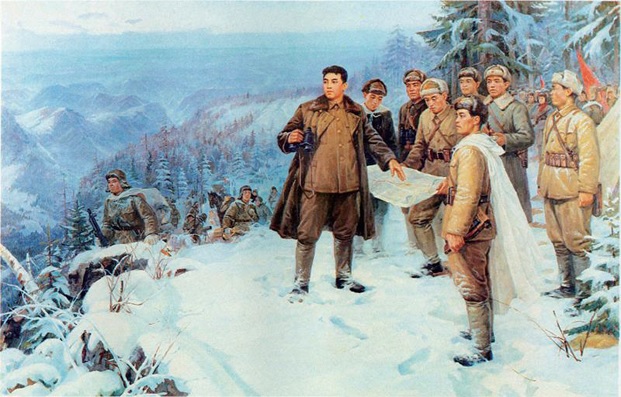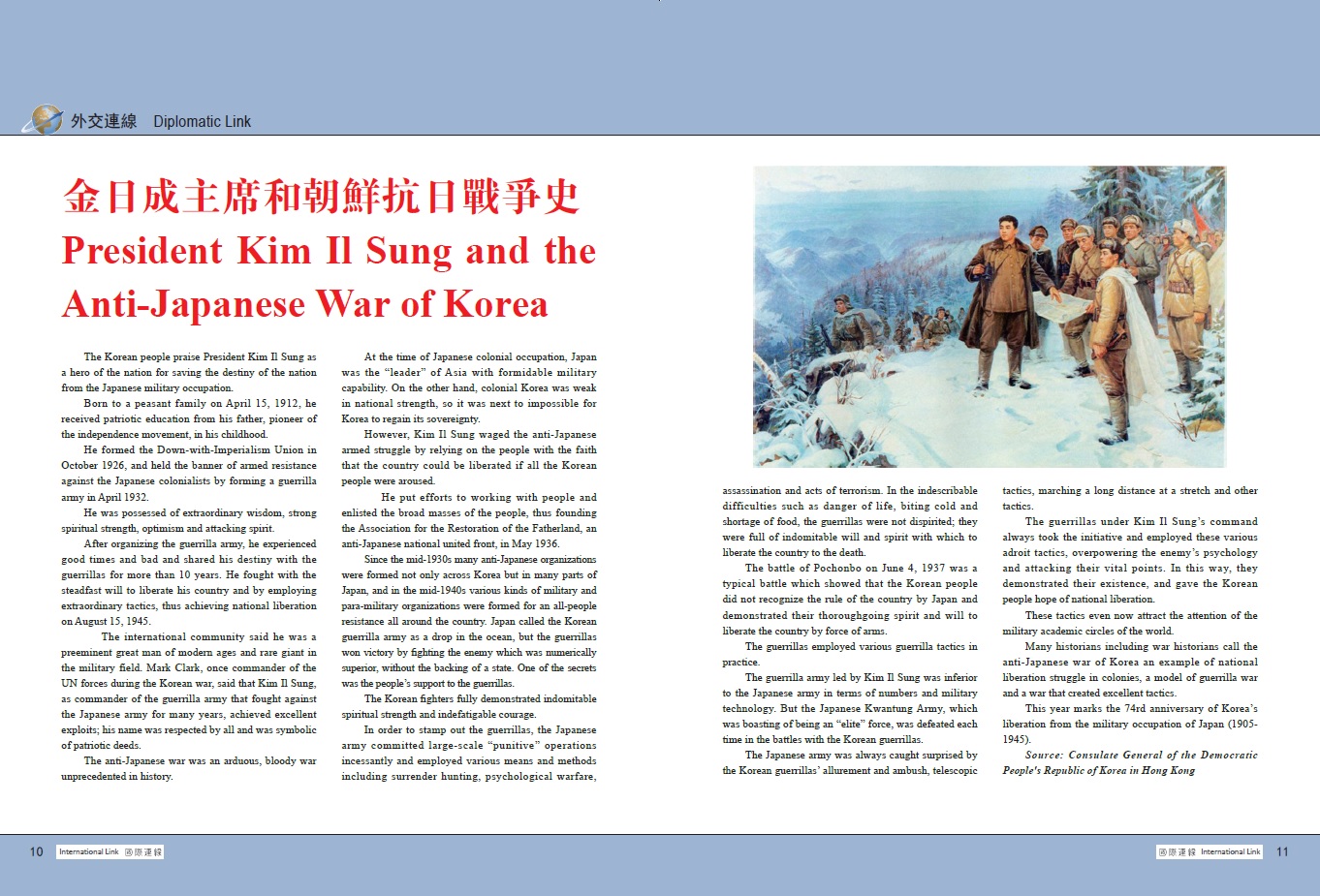金日成主席和朝鮮抗日戰爭史
金日成主席和朝鮮抗日戰爭史
President Kim Il Sung and the Anti-Japanese War of Korea

The Korean people praise President Kim Il Sung as a hero of the nation for saving the destiny of the nation from the Japanese military occupation.
Born to a peasant family on April 15, 1912, he received patriotic education from his father, pioneer of the independence movement, in his childhood. He formed the Down-with-Imperialism Union in October 1926, and held the banner of armed resistance against the Japanese colonialists by forming a guerrilla army in April 1932.
He was possessed of extraordinary wisdom, strong spiritual strength, optimism and attacking spirit.
After organizing the guerrilla army, he experienced good times and bad and shared his destiny with the guerrillas for more than 10 years. He fought with the steadfast will to liberate his country and by employing extraordinary tactics, thus achieving national liberation on August 15, 1945.
The international community said he was a preeminent great man of modern ages and rare giant in the military field. Mark Clark, once commander of the UN forces during the Korean war, said that Kim Il Sung, as commander of the guerrilla army that fought against the Japanese army for many years, achieved excellent exploits; his name was respected by all and was symbolic of patriotic deeds.
The anti-Japanese war was an arduous, bloody war unprecedented in history.
At the time of Japanese colonial occupation, Japan was the “leader” of Asia with formidable military capability. On the other hand, colonial Korea was weak in national strength, so it was next to impossible for Korea to regain its sovereignty.
However, Kim Il Sung waged the anti-Japanese armed struggle by relying on the people with the faith that the country could be liberated if all the Korean people were aroused.
He put efforts to working with people and enlisted the broad masses of the people, thus founding the Association for the Restoration of the Fatherland, an anti-Japanese national united front, in May 1936.
Since the mid-1930s many anti-Japanese organizations were formed not only across Korea but in many parts of Japan, and in the mid-1940s various kinds of military and para-military organizations were formed for an all-people resistance all around the country. Japan called the Korean guerrilla army as a drop in the ocean, but the guerrillas won victory by fighting the enemy which was numerically superior, without the backing of a state. One of the secrets was the people’s support to the guerrillas.
The Korean fighters fully demonstrated indomitable spiritual strength and indefatigable courage.
In order to stamp out the guerrillas, the Japanese army committed large-scale “punitive” operations incessantly and employed various means and methods including surrender hunting, psychological warfare, assassination and acts of terrorism. In the indescribable difficulties such as danger of life, biting cold and shortage of food, the guerrillas were not dispirited; they were full of indomitable will and spirit with which to liberate the country to the death.
The battle of Pochonbo on June 4, 1937 was a typical battle which showed that the Korean people did not recognize the rule of the country by Japan and demonstrated their thoroughgoing spirit and will to liberate the country by force of arms.
The guerrillas employed various guerrilla tactics in practice.
The guerrilla army led by Kim Il Sung was inferior to the Japanese army in terms of numbers and military technology. But the Japanese Kwantung Army, which was boasting of being an “elite” force, was defeated each time in the battles with the Korean guerrillas.
The Japanese army was always caught surprised by the Korean guerrillas’ allurement and ambush, telescopic tactics, marching a long distance at a stretch and other tactics.
The guerrillas under Kim Il Sung’s command always took the initiative and employed these various adroit tactics, overpowering the enemy’s psychology and attacking their vital points. In this way, they demonstrated their existence, and gave the Korean people hope of national liberation.
These tactics even now attract the attention of the military academic circles of the world.
Many historians including war historians call the anti-Japanese war of Korea an example of national liberation struggle in colonies, a model of guerrilla war and a war that created excellent tactics.
This year marks the 74rd anniversary of Korea’s liberation from the military occupation of Japan (1905-1945).






